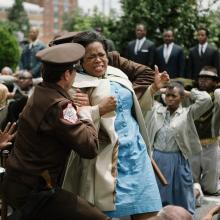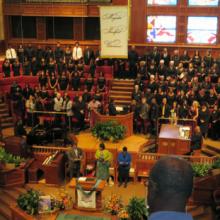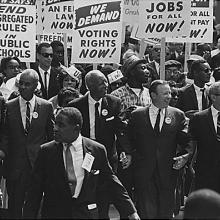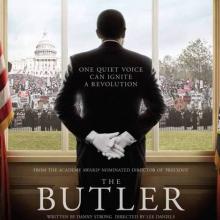Civil Rights Movement
I grew up in a household run by a woman of the civil rights movement. My mother, born Sharon Lawrence in 1948, was a teenager when she joined the Student Non-Violent Coordinating Committee in 1966, one year after Dr. King’s legendary march from Selma to Montgomery and President Lyndon B. Johnson’s passage of the 1965 Voting Rights Act. With the foundations of progress and protection laid, there was still much work to be done. My mother was based in Philadelphia, where she helped establish one of SNCC’s embattled northern offices.
A few years back, as I fished through boxes brimming with old papers and notepads, I discovered handwritten notes from James Forman to my mother. Forman offered detailed instruction to the then 18-year-old young woman who would become my mother only a few years later. Her job was much like mine is now: church outreach. The way she tells it, there were only a few churches in Philadelphia willing to offer their pulpits for movement people to speak. It was her job to secure those pulpits when giants like Forman, Stokely Carmichael, and others came to town.
I grew up aware of the women of the civil rights movement — my mother was one of them.
Perhaps that’s why I was so struck by the rare effort made by the film Selma to highlight the roles of women in that struggle, which by many accounts was the high-water mark of the civil rights movement.
Just as Selma opened in wide-release I began to receive requests for advice on how to lead churches and faith communities through discussions of the film. Years ago, I used to lead these kinds of dialogues in my capacity as the Greater Los Angeles director of racial reconciliation for a college-based parachurch ministry. Some of our most fruitful conversations came after we saw films like Selma or read a book together or had a common experience of racial injustice that we needed to process.
The film Selma is an incredibly helpful dialogue centerpiece at the moment. But like all things, other dialogue opportunities will rise and take center stage in the coming weeks and months. Other films will be released, helpful books will be published, and public events will provoke us to need to dialogue again. When those opportunities surface, I recommend using the format below as a template for similar dialogues moving forward. I’ve collected my Top 5 recommended resources to help guide your community dialogue on racial justice and Selma.
“I do know the voice of God.”
That’s what David Oyelowo, the actor who beautifully portrays Dr. Martin Luther King Jr. in the new film Selma, told me last night. It’s that voice, he said, that called him to play the role.
I was at the December preview of Selma in Washington, D.C., and then took my family to see it at an early showing on Christmas day. I sometimes respond emotionally to films, but Selma made we weep. It also made me grateful that for the first time in 50 years, a big studio had finally made a film about Dr. Martin Luther King Jr. and the people in the movement around him in Selma. I believe this movie, unlike most others, could actually change the nation’s conversation about race and reconciliation at a crucial time, perhaps even providentially.
On the premiere night, I met David Oyelowo, who spoke publically after the film about his faith. I don’t hear that kind of talk very much in D.C., but David was open and forthright, saying that playing the great Christian leader became part of his personal calling as a Christian.
In our conversation afterward, I asked David what he meant by those words. His answer prompted me to ask for an interview with him before the film, which debuts this weekend, came out. He and I talked last night (listen to the full interview below).
In the first moments of Selma, I feel butterflies rise in my stomach as Dr. Martin Luther King, Jr. (David Oyelowo) practices his 1964 Nobel Peace Prize speech while trying to tie his ascot. Butterflies rumble in my soul. I am almost fearful as we step into the world of Selma, because I am a student of the Civil Rights era. The movement’s lessons have shaped my life. I feel like I am about to meet my heroes.
So, King fiddles with his ascot in Oslo, Norway, and his wife Coretta (Carmen Ejogo) comes close to comfort him, and little girls descend into the bowels of the Sixteenth Street Baptist Church in Birmingham, Ala., and butterflies rise and my soul sits at attention. I know what is coming: hell … and glory.
The film still haunts me. Every performance is nuanced, textured, and humanizing. Director Ava DuVernay’s technique is breathtaking. Her eye translates words into feelings into images — moving images that never leave you. Brutality and reverence occupy single frames. At once, the audience is horrified and awe-struck. I have no doubt Selma should win Oscars.
It is an amazing film, but it doesn’t haunt me because of its excellence. As I sat in the dark watching the movement unfold before my eyes, it was not the past that haunted me. It was the present.
IN JANUARY 2012, I was driving in the flatlands of northern Indiana with historian and democracy activist Vincent G. Harding. I was Harding’s tour guide and chauffer for the week. As we drove he asked me what I hoped to happen at an upcoming meeting. “We’re open to whatever you feel inspired to share with us,” I responded. He replied, “Joanna, this is your community. I want to hear from you what is important in this conversation. You know better than I what your community needs to be discussing right now.”
This was the organizational formula Vincent Harding had been using for more than 50 years: Bring people together, remind them of the strength of their roots, listen to their wisdom, and connect them to a broader biblical and historical movement.
Harding, who died May 19, 2014, was a lifelong activist for the development of a compassionate, multireligious, multiracial democracy and a leading historian in the black-led freedom struggle in the U.S. Harding and his spouse, Rosemarie Freeney Harding, who died in 2004, had been colleagues of Martin Luther King Jr. and Coretta Scott King in the 1960s, and Vincent later became the first director of the Martin Luther King Jr. Center in Atlanta.
When historian, author, and longtime friend P. Sterling Stuckey heard about Harding’s death, he said he found it hard to believe because “Vincent was larger than life.” Harding’s effect on movements for justice in the U.S. was far-reaching. He was a convener of scholars, activists, artists, youth, and people of faith. He believed that transformation happened when everyone was engaged and contributing—and he believed that everyone had something to offer in the creation of a compassionate, multiracial democracy.
“Get the word out. Teach all these things. And don’t let anyone put you down because you’re young. Teach believers with your life: by word, by demeanor, by love, by faith, by integrity.” –1 Timothy 4:12 (The Message)
In our recent book Forgive Us: Confessions of a Compromised Faith, Mae Cannon, Lisa Sharon Harper, Soong-Chan Rah, and I call the American church to a posture of repentance due to all the times we have not only been on the wrong side of history, but on the wrong side of God.
As an organizer and director of the AMOS Project in Cincinnati, I’ve discovered that a humble spirit of repentance is critical to powerful work around racial and economic justice. There can be a strong temptation to replay colonialism by having all the answers and believing we are God’s gift to the oppressed. We white evangelicals are particularly susceptible to this arrogant path. Humility and a repentant spirit are key to a healthy engagement and partnership in our work.
Dr. King said: a “riot is the language of the unheard.”
What happens when folks do not feel like their voices are being heard?
They shout louder.
Rioting is what almost happened in Ferguson, and all of us who live in fragile neighborhoods with a backdrop of deep racial injustice need to pay attention.
In Ferguson, a close-knit community was devastated by yet another injustice. They wanted to be heard. But as peaceful marches began, they were met with unprecedented force.
Tears were met with teargas.
It was as if authorities were putting their hands up over their ears. So the people shouted louder – and the world began to pay attention.
At a fragile moment when emotions were running high, the people of Ferguson had to choose between rioting and nonviolent direct action in the streets. A very small group (many of them arguably out-of-state activists) resorted to some forms of property damage. And it caught the media’s attention.
Some might say it hijacked the headlines.
But that is not how I will remember Ferguson.
When I heard the news I wept.
“Renowned Poet and Author Maya Angelou Dies at 86,” read the NBC News headline.
My fruitless effort to hold back tears was proven vain as I made my way into the bowels of a D.C. Metro station — tears streaming. I felt silly.
“Why am I crying,” I thought. “I didn’t know Maya Angelou.” I met her once, but she wasn’t family or a close friend, yet I was reacting with the same profound sense of loss, as if my own beloved great grandmother had passed?
The New York Times called her a “lyrical witness of the Jim Crow South” in the headline that announced Ms. Angelou’s death this morning. But for nearly four decades Dr. Maya Angelou served as a kind of great grandmother of the African-American community — a bridge between the ancestors and us.
Dr. Vincent Harding, a theologian, historian, author, and civil right activist, died at 5:11 p.m. on Monday at the age of 82. Dr. Harding worked alongside Dr. Martin Luther King Jr., as friend, speechwriter, co-collaborator, and served as a mentor and advisor to many of the members of the Student Non-violent Coordination Committee.
Harding's social activism had deep spiritual roots in the Mennonite tradition and the Black church. Dr. Harding was one of the chroniclers of the civil rights movement as a participant, an historian, and social observer. He and his late wife Rosemarie were senior consultants to the "Eyes of the Prize" documentary film project.
Harding was a professor emeritus at the Iliff School of Theology and co-founder with his wife Rosemarie Freeney Harding of the Veterans of Hope Project, at the Center for the Study of Religion and Democratic Renewal at the Iliff School of Theology in Denver. He is also the author of numerous books, including Hope and History: Why We Must Share the Story of the Movement, There is a River: The Black Struggle for Freedom in America, and Martin Luther King: The Inconvenient Hero. Harding wrote King's famous 1967 "Beyond Vietnam" speech.
Jim Wallis, president of Sojourners and a friend of Harding, released this statement in response to Harding's death:
This is a great loss for our movement and the world and for all of us here at Sojourners. Vincent loved and served us so often in our history. He was an elder and mentor to me and to many of us. I am so grateful for a life so well lived. Thanks be to God for Vincent Harding. We are poorer for his passing and richer for having known him.
IN TERMS, America has tried to heal itself. The Civil War took place in the 1860s. The civil rights movement took place in the 1960s. From America’s two biggest domestic conflicts emerge three main elements: the first, a group of people, primarily white, the majority and ruling group in society. Let’s call this group the “Land of the Free”; the second, also a group of people, but a minority, primarily black, originally from Africa, the “Other America”; and the third element of our simplified history is the slavery and poverty that divides the first group from the second and which we will call the “Wall.” ...
There are several questions I must ask myself if I am to be a Christian in America today. One that gives me a great sense of urgency is this: “If change only comes after confrontation and violence, what type of confrontation is needed to make the country livable for all people?”
We used to sing this song in Sunday School, as far back as I can remember, way back when I was learning to use a big-boy potty and tie my shoes. The little light was our faith in Jesus, and letting it shine was sharing it with others, who didn't know him. Jesus loved the little children, all the children of the world, red and yellow, black and white, they were precious in his sight, Jesus loved the little children of the world. He would make us FISHERS! of men, FISHERS! of men, FISHERS! of men, if we followed him, if we followed him, if we FAW! LOWED! HIM! I should dare to be a Daniel, dare to stand alone, dare to have a purpose firm, dare to make it known. Even if they fed me to the lions.
It took almost 30 years for me to really see "This Little Light" in action. Before that, it was mostly an ideal standard that made me feel guilty for not living up to it, a measuring stick that set me in competition with all the other little lights around me; if I shined a little brighter, you'd try too. But two years before Occupy Wall Street demanded economic reform at the national level, the candles lit in Charlotte, N.C., as hundreds of protestors marched on Bank of America and Wachovia in the fall of 2009. In the midst of the subprime mortgage crisis, with people facing ballooning interest rates and foreclosures on their homes, organizers delivered a theological statement against what they called "usury" — the Old Testament sin of collecting interest from the poor.
They were among the youngest martyrs of the civil rights movement, four young black girls — three 14-year-olds and one 11-year-old — whose deaths in a church basement horrified a nation already torn apart by segregation.
This week, 50 years after the Ku Klux Klan bombing at Sixteenth Street Baptist Church in Birmingham, Ala., shook hopes for a colorblind country, the four girls are getting their due.
Addie Mae Collins, Cynthia Wesley, Carole Robertson and Denise McNair were posthumously awarded the Congressional Gold Medal on Tuesday (Sept. 10), a day after a piece of shattered stained glass from the church was donated to the Smithsonian.
WASHINGTON — Fifty years to the day after Martin Luther King, Jr., knocked on the nation’s conscience with his dream, religious leaders gathered in a historic church to remind the nation that he was fueled by faith.
Later, in the shadow of the Lincoln Memorial where King thundered about America’s unmet promises, King’s children joined the likes of President Barack Obama and Oprah Winfrey to rekindle what Obama called a “coalition of conscience.”
At Shiloh Baptist Church, where King preached three years before his 1963 “I Have A Dream” speech, Christian, Jewish, Muslim, and Sikh clergy summoned King’s prophetic spirit to help reignite the religious fires of the civil rights movement.
King’s daughter, the Rev. Bernice A. King, said at the service that her father was a freedom fighter and a civil rights leader, but his essence was something else.
“He was a pastor,” said King, who was 5 when her father electrified the nation in front of the Lincoln Memorial. “He was a prophet. He was a faith leader.”
I will march on Saturday because I refuse to allow my two sons to be treated as statistics or a stereotypes rather than as children of God. I will march because overly aggressive policing tactics that overly rely upon racial profiling make a mockery of Dr. King’s dream that every child will be judged by the content of their character and not the color of their skin.
I will march because the recent repeal of section four of the Voting Rights Act by the Supreme Court jeopardizes the voting rights of millions of Americans across the country, particularly in southern states where new barriers to this sacred right are already being erected.
I will march because based on national statistics, my two black boys face a one in three chance of spending some time of their lives behind bars, a disturbing and destructive reality that has been made possible in part by mandatory drug sentencing laws that must be reevaluated and changed.
As people stepped on our toes and stood anxiously in front of us, waiting to exit the crowded theater, three of us sat weeping at the close of Lee Daniels’ The Butler. Even now, as I recall that moment, it brings tears to my eyes.
How do I describe the movie? Utterly intense. Remarkable. Heartbreaking. Inspiring. A genius capturing of the complexities of the Civil Rights Movement, of the history of race in America in the 20th and early 21st centuries, of presidential decision making, and of family.
I sat next to my colleague, Lisa Sharon Harper, who sobbed at the violence, tragedy, and passionate courage displayed on screen. It was a challenge. To be a white woman sitting next to an African-American woman as she wept over the suffering of her people — often at the hands of my people. It was neither her nor I who had perpetrated these specific acts, but we are certainly still caught in the tangled web of systemic racism and the histories that our ancestors have wrought us.
Even as we had waited in the theater prior to the movie's start, we spoke of serious subjects. She shared some of her lineage and the challenges of legal records that simply do not exist when ancestors are slaves or perhaps a Cherokee Indian who escaped the Trail of Tears in Kentucky and suddenly appears on the U.S. Census in 1850 as an adult. We spoke of her leadership in the church, and I encouraged her to continue speaking even though she is one of the lone women who graces the stages in front of national audiences. I told her, "You must do this so that other women who come after you can do this. You must do this for women right now. You must do this so that I can do this." We bonded over being women in ministry.
And then the separation came. I do not know Lisa's shoes — the road that she walks due to the color of her skin. I see her in all of her glory — passion, intelligence, creativity — and not in all of her blackness. Our world sees her with racial eyes.
It may have taken a little bit of prodding — a little ‘you-want-me-to-do-what?’ and a lot of faith — but in the end, Congressman John Lewis agreed to go along with staffer Andrew Aydin’s out-of-the-box idea. The result: March (Book 1) — the first of a three-part graphic novel autobiography chronicling Lewis’ life and the Civil Rights Movement.
“The story of the movement that we tell is very much John Lewis’ story in this first book,” Aydin said. “It is a story of him growing up poor, on a farm, and it builds to a climax of the national sit-in movement.”
Lewis certainly has a lot to tell. He and other activists famously were beaten by police on the Edmund Pettus Bridge in Selma, Ala., in 1965 during an attempted march for voting rights — an event that became known as “Bloody Sunday.” He served as chairman of the Student Nonviolent Coordinating Committee during the height of the movement, spoke at the historic March on Washington alongside Dr. Martin Luther King, Jr., and was instrumental in the passage of the Voting Rights Act of 1965.
Aydin, who co-wrote the book with Congressman Lewis, and illustrator Nate Powell sat down with Sojourners to explain how the series came about and why it is such an important story these 50 years later.
This August will mark the 50th anniversary of Martin Luther King’s “I Have a Dream” speech, and there will rightly be much remembrance and celebration of its place in American history. But there is another anniversary that our nation, and especially its Christians, would do well to acknowledge, investigate, and ruminate.
Forty-five years ago yesterday, Dr. King arrived in Memphis, Tenn., to support a sanitation workers’ strike seeking to unionize. He was assassinated the next day — the anniversary we today remember — and in a sad irony our nation began the sanitation of his legacy. Indeed, King’s decision to join the Memphis struggle was just one of many acts that clash with what David Sirota calls the “Santa Clausified” image of King that we pass to our youth.
Fifty years ago, not long after his graduation from Brandeis University, Rabbi Allen Secher became a Freedom Rider, joining Dr. Martin Luther King's historic fight for equality in the South. In Albany, Georgia, Secher, who served congregations in Mexico City, New York, Los Angeles and Chicago before relocating to Whitefish, Mont., several years ago (where he was, for a time, the only resident rabbi in the entire state), was jailed for a week along with a number of other Freedom Riders.
Inside, watch Secher, aka "The Naked Rabbi," tell the story of the Freedom Rides and his encounter with King.
If justice is only an implication, it can easily become optional and, especially in privileged churches, non-existent. In the New Testament, conversion happens in two movements: Repentance and following. Belief and obedience. Salvation and justice. Faith and discipleship.
Atonement-only theology and its churches are in most serious jeopardy of missing the vision of justice at the heart of the kingdom of God. The atonement-only gospel is simply too small, too narrow, too bifurcated, and ultimately too private.















